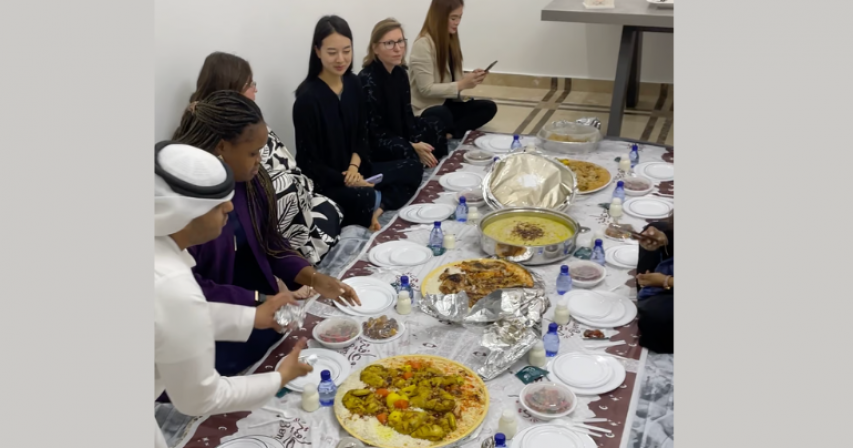UAE: Non-Muslims sit down for an Emirati iftar, experience warmth of culture at this home

To help promote understanding across culture, Mohammad Rashid Al Zaabi invited some non-Muslim guests to attend an iftar where he served them with the traditions of Ramadan in the UAE.
We, Emiratis, always have the reputation for this hospitality. We are open to everyone, Muslims and non Muslims as well, Al Zaabi said. "We were taught by the late Sheikh Zayed to open our houses to all,"
Kamini, who hailed from Malaysia, said she had never been to an iftar before. She wanted to help her drink the experience fully, so she fasted the whole day, hoping to comprehend the meaning of the moment. As she intoxicated the Emirati house, she was welcomed into the very local hospitality experience.
As soon as I walked in the doors, the warmth and hospitality of the hosts washed over me. From the importance of dates when breaking fasts to family gathering traditions, they explained everything to us," Kamini said.
The traditional floor seating also made the iftar special for Kamini. She noticed that floor seating is common in Malaysia but the Emirati style was unique and it brings the vibe of togetherness and unity. The one thing I looked forward to the most was finding out why people sit on the floor to eat. But over breaking bread and swapping tales, I started to see what a unifier it is. Kamini remembered, "It was beautiful."
Suji Lim from South Korea said of the Emirati iftar she'd been invited to: "It was very different and considerable." She said she had seen pictures on Instagram of iftar, and thought it would be organized — people seated on the ground, enjoying a meal together, and learning about the culture. But the reality exceeded her expectations in some key areas.
Suji said: "The food was better than I expected, and so was the hospitality. But what really stood out to her was the new people she was able to connect with, learning from various cultures, and sharing the table while talking about the world.
Well, one of the biggest culture shocks for her was the attention Emiratis give to generosity. "There are plenty of food to eat. That no one should be hungry, that everyone is taken care of," she said.
Beyond the food, though, the use of Bakhoor (a kind of traditional Emirati fragrance that leaves a lingering scent on the clothing and hair) caught Suji's attention. One of the things that stuck in my mind was the tradition where the host would come to your hand and rub some aroma oil into your hand.
Tajik national Ghani shared his thoughts on breaking fast in an Emirati home. He thought it would be a speedy meeting, but it ended up being engaging and informative. I thought it would be faster and we're just gonna come here and eat, but it was more of an experience, honestly," he said.
He cited the food as a big highlight for him. Now, I have never eaten Emirati food. He said the desserts, too, were the highlight.
During the meal, he said he admired the fresh produce served, saying, "The dates were from his farm, the tomatoes were from his farm, which was a really neat thing, too. It made me appreciate the food experience.
It was more than a dinner party. To pass on to others the history and traditions of the UAE. Al Zaabi said that Ramadan is a sacred month and it contains enormous spiritual and communal significance. "I wish to explain to them how we used to practice Ramadan, what significance Ramadan had, and the meaning of worship in Ramadan, We also wanted to get them acquainted with our local culture.'
Al Zaabi explained, "We told them about popular Emirati foods, traditional Ramadan drinks, and the importance of dates as a food item to break the fast." Among those essential Ramadan etiquettes, he also reported the outstanding wondering which about resting collectively just before iftar and the great important consider and perseverance before of the Maghrib prayer.
For 13 years now, the Sheikh Saud bin Saqr Al Qasimi Foundation has been organising an annual iftar activity for the entire community. Every year, a different Emirati house plays host, to offer non-Muslims and expats in Ras Al Khaimah a taste of a traditional iftar meal and a taste of Emirati hospitality. The 2025 edition hosted more than 18 nationalities in the iftar.






Comments